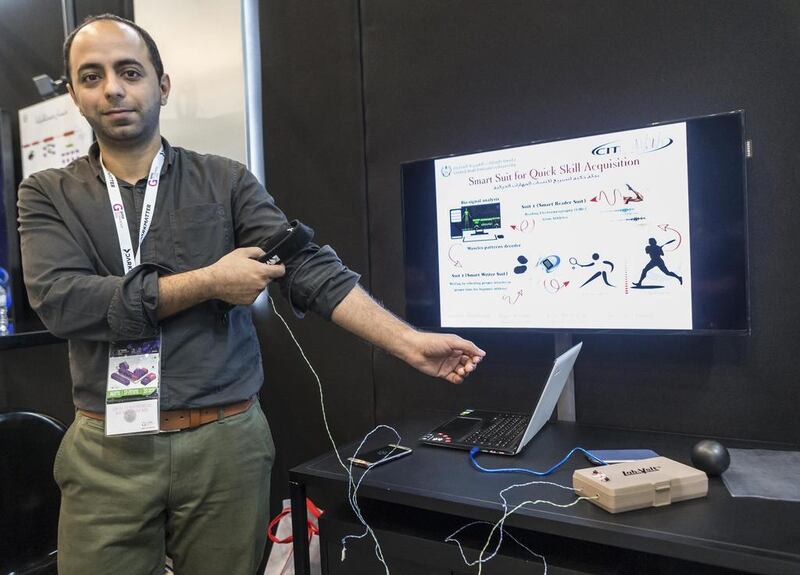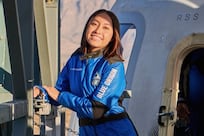AL AIN // A neuroscientist at UAE University is developing a high-tech sensor that uses brainwaves to help stroke victims relearn how to use their muscles.
Dr Fady Al Najjar’s smartsuit for quick skill acquisition, a strap-on sensory device, connects to the muscles through electromyography, or vibrations sent from the brainwaves. The vibrations retrain movement in the muscles, picking up old patterns.
“After strokes, the brain loses the best way to communicate with muscles, which causes paralysis. We need to teach the brain again to communicate with these muscles,” Dr Al Najjar said.
“The brain sends electric shockwaves to which the muscles respond, speaking to the muscles in ways the muscles understand.”
The technology has many applications, including in sport, and it’s not only for humans but also animals such as race horses. But, for now, the focus is on stroke patients.
“Training the muscles in the usual way could take three to four months but this is a much shorter process as it’s going directly to the muscles and connecting with the brain,” Dr Al Najjar said.
“Mostly, a stroke patient knows they want to eat but the message simply isn’t going to the right muscles to put that into action.”
His project is being sponsored by the Telecommunications Regulatory Authority, which is funding inventions around the country that could be of benefit to government bodies in the near future.
Hamad Dheyab, of the TRA’s policy and programmes department, said the project was part of its centre for digital innovation, which has this year begun to work with local universities and academia.
“Innovation comes from academia,” Mr Dheyab said. “We had a lot of projects submitted but this one looked most likely to become a product in the shortest time.”
Projects funded are provided with technology and a research budget. Mr Dheyab said the smartsuit would be used by the Ministry of Health.
“It has a lot of potential, though we need to do more yet,” he said.
Dr Al Najjar and his team will soon begin work with Al Ain Hospital after the ethics committee gives its approval to test the smartsuit on patients.
He said that introducing robotic devices to the hospital was initially met with scepticism.
“At first the idea wasn’t too welcome but we ran two workshops with doctors and showed them how it could be used for rehabilitation and we had good feedback,” Dr Al Najjar said. “People were interested in the technology.”
Lii Schacht, specialist in naprapathy – a blend of chiropractics and physiotherapy – said the technology would be useful for stroke patients.
“Stimulating the muscles via electromyography is a great way to activate and stimulate the nervous system, brain and muscle connection and activation,” Ms Schacht said. “It works to both increase circulation and keep the muscles from atrophy.”
She said the suit was “great technology” but needed to be used alongside other treatments for stroke patients.
“The nervous system needs to be stimulated with repetitive movements which will facilitate improvement of motor function,” Ms Schacht said. “For this reason, motor movement stimulation might be more effective in improving motor control than simple sensory stimulation.”
But Dr Al Najjar said the system was different to the technology currently available.
“What’s new here is the ability to use this motor skill information to recall the healthy patterns using vibrators,” he said.
The technology currently available uses only direct muscle stimulation, one muscle at a time, known as bio-feedback.
“Bio-feedback has limitations with electric stimulation, since it is just a reflex mechanism which does not involve any voluntary signals,” said Dr Al Najjar.
mswan@thenational.ae





